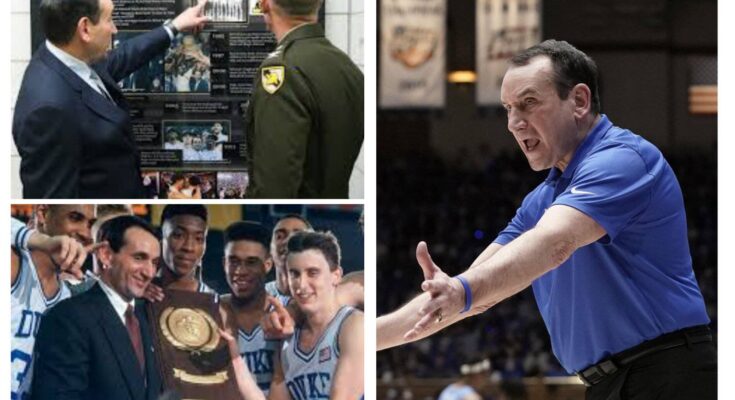Coach K Explains the Mindset That Made Duke a Dynasty: “No Excuses, No Looking Back.”
Mike Krzyzewski, better known as Coach K, stands as one of the towering figures in the history of college basketball. His name is synonymous with success, leadership, and a relentless pursuit of excellence. Under his guidance, Duke University transformed into a powerhouse program, claiming five NCAA national championships and cementing its legacy as one of the greatest dynasties in the sport. But what exactly was the mindset that fueled this unprecedented success? Coach K distilled it down to two simple yet profound principles: “No excuses, no looking back.”
Before delving into the mindset, it’s essential to understand the man behind the legend. Mike Krzyzewski’s journey to becoming a coaching icon began long before Duke’s national titles. As a player, he was a point guard at the United States Military Academy at West Point. His time there shaped much of his approach to leadership — discipline, accountability, and service to others.
Krzyzewski’s military background translated seamlessly into his coaching philosophy. He viewed coaching not just as teaching basketball but as mentoring young men to be leaders on and off the court. This emphasis on character was the foundation upon which the Duke dynasty was built.
At the heart of Coach K’s philosophy is an unwavering refusal to make excuses. In his view, elite performance demands total accountability. “No excuses” means owning every action, every outcome — good or bad — and learning from it. It’s about controlling what you can control, rather than blaming external circumstances.
For a basketball team, this mindset eliminates distractions. It forces players to focus solely on preparation and execution. Instead of dwelling on missed calls by referees, injuries, or tough travel schedules, Coach K’s teams would zero in on what they could influence: their effort, teamwork, and execution of the game plan.
This refusal to make excuses created a culture of resilience at Duke. When challenges arose — and they always do in competitive sports — the team responded with determination rather than complaint. Injuries were treated as obstacles to overcome, not reasons to falter. Losses were viewed as opportunities for growth, not failures to lament.
The second half of Coach K’s mantra is “no looking back.” This speaks to the importance of mental focus and resilience. Dwelling on past mistakes or failures saps energy and confidence. Instead, Coach K taught his players to learn from the past but keep their eyes fixed firmly on the future.
After every game, whether a thrilling victory or a crushing defeat, Duke players were expected to quickly reset. They’d review the film, take lessons from it, and then move on. This mindset fostered a sense of renewal and continuous improvement.
“No looking back” also encouraged Duke teams to embrace the present moment. In high-pressure situations — such as NCAA Tournament elimination games — the ability to stay mentally present and avoid distractions was crucial. Coach K’s players learned to block out outside noise and focus on executing their roles.
While talent is undoubtedly important in sports, Coach K believed culture was the true secret to sustaining success. He once said, “I’m convinced the culture of a team is everything.” This culture was anchored in accountability, trust, selflessness, and the two principles of no excuses and no looking back.
Coach K’s leadership style emphasized humility despite success. Even after winning multiple championships, the team atmosphere was one of hard work, respect, and mutual support. Every player understood that their individual success was tied to the team’s success. This selflessness was a cornerstone of Duke’s dominance.
The culture also extended beyond the court. Coach K invested deeply in his players’ personal development — academically, socially, and emotionally. Many of his former players credit him not just for basketball success but for preparing them for life beyond the game. This holistic approach attracted top recruits who wanted to grow as people, not just athletes.
At Duke, pressure was a constant companion. As the program’s national profile grew, so did expectations from fans, media, and the basketball world. Coach K’s approach to this pressure was straightforward: embrace it, don’t fear it.
He taught his players to see pressure as a privilege. Being in high-stakes games was a sign of their success and the opportunity to prove themselves on a big stage. This positive mindset helped Duke teams stay composed and confident during critical moments.
Moreover, Coach K prepared his players to deal with pressure through relentless practice and repetition. The more prepared a team felt, the less intimidating the moment became. Preparation bred confidence, which in turn led to poise under fire.
Duke’s five national championships — won in 1991, 1992, 2001, 2004, and 2010 — are a testament to the effectiveness of Coach K’s mindset. Each championship team faced its own unique challenges, yet the same principles guided their journey.
- 1991 and 1992: These back-to-back titles established Duke as a national powerhouse. The teams were known for their tenacious defense and clutch performances. Coach K’s insistence on accountability and resilience helped the team overcome tough opponents and pressure-filled moments.
- 2001: This championship came after a rebuilding phase and demonstrated the importance of patience and persistence. Coach K’s “no looking back” philosophy was evident as the team refused to be weighed down by previous seasons’ disappointments.
- 2004: The team was balanced and disciplined, a direct reflection of the culture Coach K had cultivated. The players executed with precision, proving that preparation and teamwork trump raw talent.
- 2010: Perhaps the most poignant championship, as it came during the twilight of Coach K’s career. It symbolized a legacy of excellence and the culmination of decades of leadership and cultural building.
Coach K’s influence extends beyond basketball. His principles have been applied in business, education, and personal development. The mantra “No excuses, no looking back” resonates with anyone striving for success under pressure.
In business, this mindset translates to accountability in decision-making and resilience in the face of setbacks. Leaders who refuse to make excuses and learn quickly from failures are often the most effective.
In education, Coach K’s focus on character development alongside skill growth models a holistic approach to teaching. Students learn the value of hard work, integrity, and adaptability.
On a personal level, the mindset encourages mental toughness and focus. Life inevitably presents obstacles, but those who take ownership of their actions and keep moving forward are better positioned for long-term success.
While five national championships and over 1,000 career wins are remarkable achievements, Coach K’s true legacy lies in the lives he touched and the culture he built. His emphasis on “No excuses, no looking back” created a blueprint for excellence that transcended basketball.
Players who passed through Duke under Coach K often describe him as a mentor and father figure. They carry the lessons learned into their careers, families, and communities. This ripple effect is perhaps the greatest testament to his mindset.



